
6 Advantages of Doing Business in Australia (with Stats and Data)


Explore the advantages of business in Australia, from a strong economy and skilled workforce to favorable regulations and access to global markets.

Australia might not be the first place that comes to your mind when thinking about global business hubs, but maybe it should be.
With a resilient economy, a skilled workforce, and a welcoming, vibrant culture, Australia offers a unique combination of benefits that can set up a business for sustainable growth.
If you're on the fence about expanding to or starting a business in this country, here are some compelling reasons to take the leap.
1. Business Registration Cost
When looking at business registration costs across key locations, Australia offers a range of options, with costs varying by structure.
- For sole traders and partnerships, registration costs are minimal, mainly around AUD 50 for obtaining an Australian Business Number (ABN), business name registration, and GST registration.
- Proprietary companies in Australia face a broader range of fees, between AUD 500 and AUD 1,500, depending on government and legal services.
- Public companies may incur even higher setup costs, with annual fees reaching up to AUD 3,000 based on complexity.
Here is the latest update regarding registration costs, according to ASIC: 👇
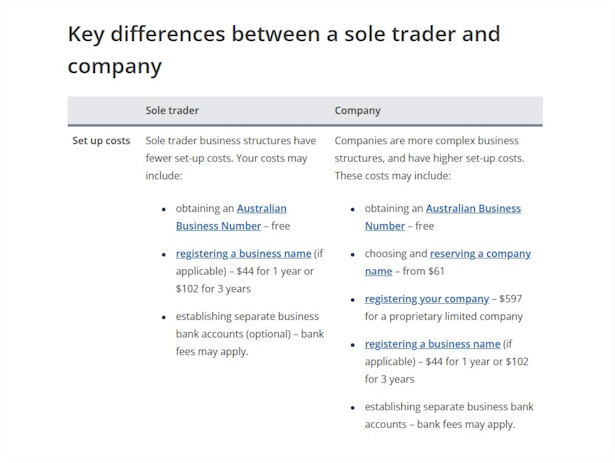
In comparison, sole proprietorships in the United States pay around USD 70 to USD 100 for a business license.
At the same time, LLCs face costs that vary greatly by state, like California's USD 70 registration plus an annual USD 800 franchise tax. Corporations in the U.S. see fees from USD 100 to USD 300 for incorporation, with added annual costs based on the state.
In the United Kingdom, registering as a sole trader requires no upfront fees but HMRC self-assessment. Limited companies in London have a minimal registration cost of GBP 12 to GBP 100.
However, annual accounting fees can exceed GBP 500, especially for ongoing support.
For Canadian entrepreneurs in Ontario, sole proprietorship registration costs CAD 60 to CAD 80, while incorporating a business costs CAD 200 to CAD 400, with annual fees adding another CAD 100 to CAD 300.
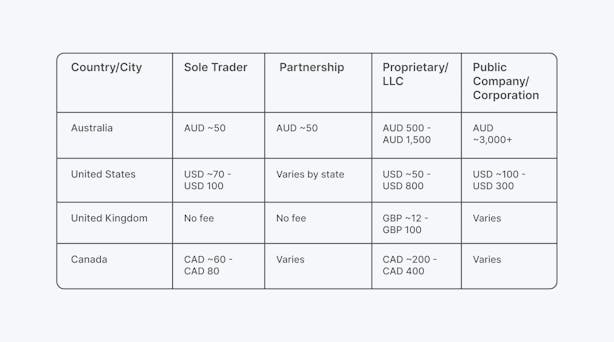
Starting a business in Australia is known for its simplicity, thanks to a supportive system and clear steps. Here's a breakdown of the process:
- Choose a Business Structure: You can pick from options like Sole Trader, Partnership, or Proprietary Limited Company (Pty Ltd). The Pty Ltd is especially popular because it limits owners' personal liability.
- Register Your Business Name: After choosing a structure, register your business name online with the Australian Securities and Investments Commission (ASIC). Ensure it's unique and meets ASIC's requirements.
- Get an Australian Business Number (ABN): This number is essential for tax and allows you to register for Goods and Services Tax (GST) and other taxes as needed. You can easily apply online.
- Open a Business Bank Account: Having a separate bank account for business finances makes it easier to track expenses and maintain clear records.
- Meet Compliance Requirements: Depending on your industry, you may need specific licenses and must be aware of employment, tax, and consumer rights regulations.
- Timeline: If your documents are ready, most applications can be done online in about 20 minutes. In many cases, businesses are ready to operate within four weeks.
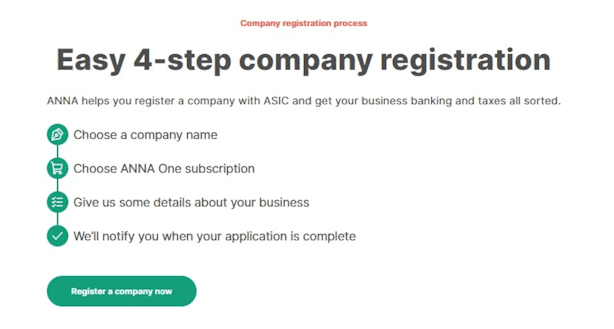
2. Cost Of Office Renting
In 2024, office rental costs in Australia show notable differences depending on location and workspace style, making it worth exploring options. Nationally, renting a private office averages around AUD 665 per desk monthly, while coworking desks are slightly lower at AUD 500. But the real story unfolds when we dive into specific states and cities:
- Starting with New South Wales (NSW), private offices average about AUD 750 per desk, driven up by Sydney's high demand in the CBD.
- Victoria follows closely at AUD 700, while Queensland and Western Australia are slightly more budget-friendly at AUD 636 and AUD 650, respectively.
- The average for those in South Australia (SA) is around AUD 646, and the ACT offers the lowest rates at AUD 500 per desk.
💡 Did you know? Up to 55% of Australia’s workforce prefers a hybrid work model, and currently, 34% of employees are already working in a hybrid setup.
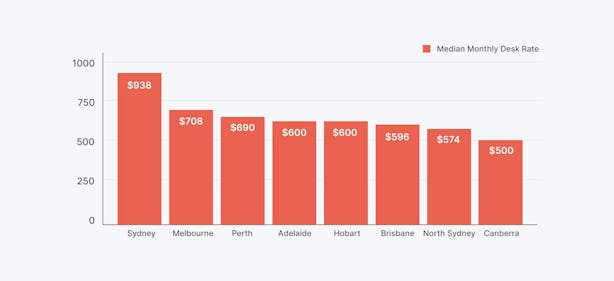
In major cities, Sydney leads with private offices at around AUD 938 per desk – unsurprisingly the highest nationwide – while coworking spaces are more economical at about AUD 600. Melbourne keeps pace, with private desks at AUD 735 and coworking options close at AUD 720.
Moving to Brisbane, you'll find private desks at around AUD 621, and Perth comes in at AUD 750, with coworking desks slightly lower at AUD 675.
Adelaide stands out as one of the more affordable options, averaging AUD 634 per desk.
Trends show a slight price increase overall, with demand surging for smaller office spaces or even virtual offices as companies embrace flexible work setups post-pandemic.
3. The Rise of Digital Advertising
In 2024, digital advertising has taken the lead as Australia's favourite way for businesses to connect with customers.
Social media and search engines dominate this space, with each channel offering unique ways to target specific audiences and boost engagement.
- Social Media Advertising remains at the forefront, with Facebook capturing around 63% of social media budgets, followed by Instagram at 27%. This allocation reflects social media's power in reaching diverse, highly-engaged audiences. In fact, brands invested 78% of their digital ad budgets in social media last year, underlining its essential role in modern marketing.
- Search Engine Advertising is also crucial, with Google Ads leading the pack. Businesses typically invest between AUD 8,000 and AUD 12,000 per month to stay visible in search results, paying an average of AUD 2 to AUD 4 per click, depending on the competition.
- Audio Advertising is gaining momentum, thanks to podcasts and streaming services like Spotify. Revenue from audio ads has jumped 21% year over year as brands seek more immersive ways to engage their audience.
Despite digital's dominance, traditional advertising holds steady for broader reach. Television ads still attract major brands, especially during peak viewing, while radio advertising remains popular among local businesses connecting with community audiences.
So, to reach your audience effectively, find the balance between digital innovation and traditional methods!

4. Strong Economy
Australia's economy has a lot going for it, especially if you're considering setting up or expanding a business here. A stable, resilient market and a business-friendly environment offer a reliable foundation for growth:
- Consistent Economic Growth: Despite global ups and downs, Australia's economy grew by 1.5% in the last year, showing a steady recovery. This resilience, backed by government support and recovering consumer spending, creates a solid, dependable market where businesses can plan for the future with confidence.
- Currency Stability: The Australian dollar remains stable against major currencies, which is especially helpful if you're planning on international trade or simply want more predictable financial planning. Stable currency means less risk, making it easier to budget and expand.
- A Strong Banking Sector: Australia's well-regulated banking sector gives businesses a secure financial environment, whether you're looking for investment or simply want a stable banking framework.
- Transparent Regulatory Framework: Australia's clear regulations are designed to make it easier for businesses to operate smoothly, promoting fair competition while protecting investors. For you, this means a streamlined process without unnecessary red tape, letting you focus on growing your business.
- High Consumer Confidence: Positive consumer sentiment keeps demand steady across sectors, which is beneficial if you're aiming to enter the market. Australians are spending, creating plenty of opportunities for businesses in everything from retail to professional services.
Key Sectors Worth Exploring
Australia's economy thrives on a mix of well-established and rapidly growing sectors, each making significant contributions to its overall resilience and GDP. Here's a closer look at the sectors driving Australia's economic engine:
1. Service Sector: Dominating about 65% of GDP, this sector includes essential services like finance, healthcare, education, and professional services. The financial services industry alone adds 7.4% to GDP, which is crucial in supporting domestic and international markets.
2. Mining and Resources: Accounting for 13.5% of GDP, Australia's rich natural resources make it a global leader in exports like iron ore, coal, and natural gas. With steady demand from international markets, especially China, mining continues to attract investment and drive economic growth.
3. Agriculture: Though it contributes 2% of GDP, Australia's agricultural sector is a major global player, exporting products such as beef, wheat, and dairy. Known for its resilience and sustainable practices, agriculture supports food security across the Asia-Pacific.
4. Manufacturing: Representing 11% of GDP, manufacturing is key in job creation and local economic stability, focusing on industries like food processing, machinery, and chemicals.
5. Construction: Contributing around 9.5% of GDP, the construction sector is buoyed by government spending on infrastructure and increasing demand for housing and commercial space, reflecting Australia's growing population.
6. Healthcare: With a contribution of 12.8% to GDP, healthcare is one of Australia's fastest-growing sectors, driven by an aging population. This sector is set to expand further, with an estimated annual growth rate of 4.5% from 2021 to 2028.
7. Technology, Media, and Telecommunications (TMT): As an emerging sector, TMT is experiencing rapid growth thanks to advances in AI, blockchain, and a robust startup ecosystem, attracting significant investments in cutting-edge technologies.
5. Strategic Geo Position
If you're considering expanding your business, Australia's position in the Asia-Pacific region provides a range of strategic advantages that are hard to match. Here's how setting up in Australia can support your growth and open doors across Asia's dynamic markets.
1. A Strategic Gateway to Asia's Major Economies
Australia's location isn't just convenient; it's a gateway to powerhouse economies like China, Japan, South Korea, Singapore, and Indonesia.
Being positioned along critical trade routes allows businesses in Australia to connect directly to Asia's high-demand markets while still benefiting from Australia's stable environment.
Imagine setting up here and having access to both Western and Eastern markets, seamlessly navigating the Indo-Pacific trade routes. This geographical advantage alone can transform how you expand and connect with global customers.
2. Strengthened Economic Ties with Southeast Asia
Australia has prioritised building robust relationships with Southeast Asia, which is expected to become the world's fourth-largest economy by 2040. This means more than just access – it means investment in sectors where growth is booming.
For example, Australia's government has focused on expanding technology, infrastructure, and agribusiness ties. If your business aligns with these areas, Australia can connect you with lucrative markets that are actively seeking solutions in these sectors.
3. Diversification Brings Stability and Security
Australia is committed to building partnerships beyond China and strengthening ties with other key economies like India and Japan. This diversification isn't just about expanding reach. It's about reducing dependence on any single market and providing more economic stability.
For your business, this means a safer investment environment. When your operations are based in Australia, you're tapping into a region that's hedged against geopolitical uncertainties, making it a reliable, long-term option for expansion.
4. Resource-Rich Economy for Tech and Energy Sectors
Australia's natural resources are invaluable, especially for industries driving the future. If your business operates in technology, renewable energy, or manufacturing, Australia's rich reserves of minerals like lithium and rare earth elements could be a direct advantage.
These resources are essential for batteries, tech devices, and sustainable energy solutions, with demand rising sharply in Asian markets focusing on green energy.
Setting up in Australia means aligning with a nation that's a critical supplier in the global green transition, providing you with both resources and a strategic position in the supply chain.
5. A Stable, Business-Friendly Environment
Beyond its geographic and economic advantages, Australia offers a transparent regulatory framework and a highly stable political environment. These conditions are vital if you're looking to expand with confidence and predictability, knowing that your business can grow without unexpected barriers.
6. Government Support and Incentives
The Australian government actively supports small and medium-sized enterprises (SMEs), recognising their critical role in driving the national economy. The government helps businesses grow, innovate, and compete globally through various programs and incentives:
- Research and Development (R&D) Tax Incentive: This incentive offers tax offsets to companies investing in R&D, making it easier for businesses to innovate and stay competitive.
- Entrepreneurs' Programme: Provides funding and business advisory services to support growth.
Comprehensive Support Programs
Beyond general incentives, the government has launched targeted programs to foster innovation and growth in SMEs:
- Industry Growth Program: This program offers grants from AUD 50,000 to AUD 5 million, along with advisory services, to support projects that enhance manufacturing and technological capabilities. The program focuses on sectors like renewable energy, medical science, and advanced manufacturing, as prioritised by the National Reconstruction Fund.
- Small Business Digital Champions: Encourages SMEs to embrace digital technologies by providing resources and funding, helping them remain competitive in an increasingly digital marketplace.
- Clean Energy Grants: These grants support businesses investing in renewable energy and energy efficiency improvements, aligning with Australia's commitment to reducing carbon emissions.
- Regional Development Funding: Promotes economic growth and job creation in regional areas, offering SMEs outside major cities financial support to thrive locally.
💡 Did you know? Acknowledging small business owners' unique challenges, the government has launched mental health initiatives, like NewAccess for Small Business Owners.
This program provides free support to help entrepreneurs manage stress and improve well-being.
Final Thoughts: Could Australia Be Your Business's New Home?
Australia combines economic strength, a welcoming culture, and access to some of the world's most exciting markets, making it a fantastic place for business.
With government support, a diverse workforce, and a commitment to innovation, Australia provides a robust foundation for success. So, if you're weighing options for where to take your business next, don’t overlook these advantages of doing business in Australia!
📌 Also, don’t miss out on our 12 Benefits of Registering a Company in Australia post!
Why ANNA is the Perfect Partner for Starting and Running Your Business in Australia
Running a business is exciting, but it can come with its fair share of stress – from managing paperwork and ensuring tax compliance to keeping track of finances and deadlines. With ANNA, however, you don't have to handle it all alone.
⚡ Effortless Company Setup
ANNA takes the hassle out of company registration. With just a few steps, you'll have your Australian Company Number (ACN) and all the necessary ASIC documents sent right to your inbox. Need an ABN? ANNA can handle that, too, so you're ready to start operating immediately with everything in place.
⚡ Complete Business Management in One Platform
ANNA doesn't stop at setup; it helps you run your business smoothly every day. Here's how:
- Easy Financial Management: Quickly track expenses, open a business account, automatically sort receipts, and view all transactions in one spot.
- Stay on Top of Taxes: With ANNA's tools, managing GST, issuing tax invoices, and preparing for annual returns is straightforward, helping you stay compliant and avoid missed deadlines.
- Send Polished Invoices: Design professional, branded invoices in seconds, and ANNA will even send gentle reminders if payments are delayed.
- Reliable Support Anytime: Need help with tax or compliance? ANNA's expert accountants are just a message away, offering practical guidance 24/7.
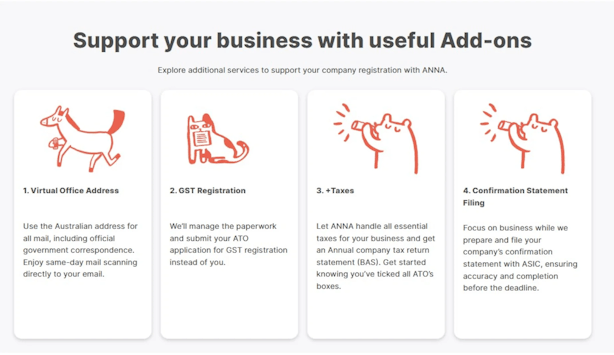
Ready to make your vision a reality?
With ANNA by your side, building your business in Australia has never been easier!






